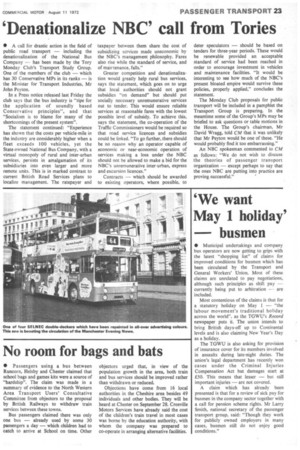'Denationalize NBC' call from Tories
Page 25

If you've noticed an error in this article please click here to report it so we can fix it.
• A call for drastic action in the field of public road transport — including the denationali 7ation of the National Bus
Company has been made by the Tory Monday Club's Transport Study Group. One of the members of the club — which has 30 Conservative MPs in its ranks — is the Minister for Transport Industries, Mr John Peyton.
In a Press notice released last Friday the club says that the bus industry is "ripe for the application of soundly based Conservative principles", and that "Socialism is to blame for many of the shortcomings of the present system".
The statement continued: "Experience has shown that the costs per vehicle-mile in the industry are considerably higher when a fleet exceeds 100 vehicles, yet the State-owned National Bus Company, with a virtual monopoly of rural and inter-urban services persists in amalgamation of its subsidiaries into even larger and more remote units. This is in marked contrast to current British Road Services plans to localize management. The ratepayer and taxpayer between them share the cost of subsidizing services made uneconomic by the NBC's management philosophy. Fares also rise while the standard of service, and of mairtenance, falls."
Greater competition and denationalization would greatly help rural bus services, says the statement, which goes on to urge that local authorities should not grant subsidies "on demand" but should put socially necessary unremunerative services out to tender. This would ensure reliable services at reasonable fares with the lowest possible level of subsidy. To achieve this, says the statement, the co-operation of the Traffic Commissioners would be required so that road service licences and subsidies could be linked. "To go further, there should be no reason why an operator capable of economic or near-economic operation of services making a loss under the NBC should not be allowed to make a bid for the NBC's unremunerative inter-urban, express and excursion licences."
Contracts — which should be awarded to existing operators, where possible, to deter speculators — should be based on tenders for three-year periods. These would be renewable provided an acceptable standard of service had been reached in order to encourage investment in vehicles and maintenance facilities. "It would be interesting to see how much of the NBC's present bloated empire would survive these policies, properly applied," concludes the statement.
The Monday Club proposals for public transport will be included in a pamphlet the Transport Group is preparing. In the meantime some of the Group's MPs may be briefed to ask questions or table motions in the House. The Group's chairman, Mr David Wragg, told CM that it was unlikely that Mr Peyton would be one of these. "He would probably find it too embarrassing."
An NBC spokesman commented to CM as follows: "We do not wish to discuss the theories of passenger transport organization — except perhaps to say that the ones NBC are putting into practice are proving successful."




























































































